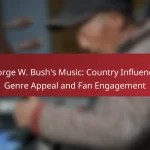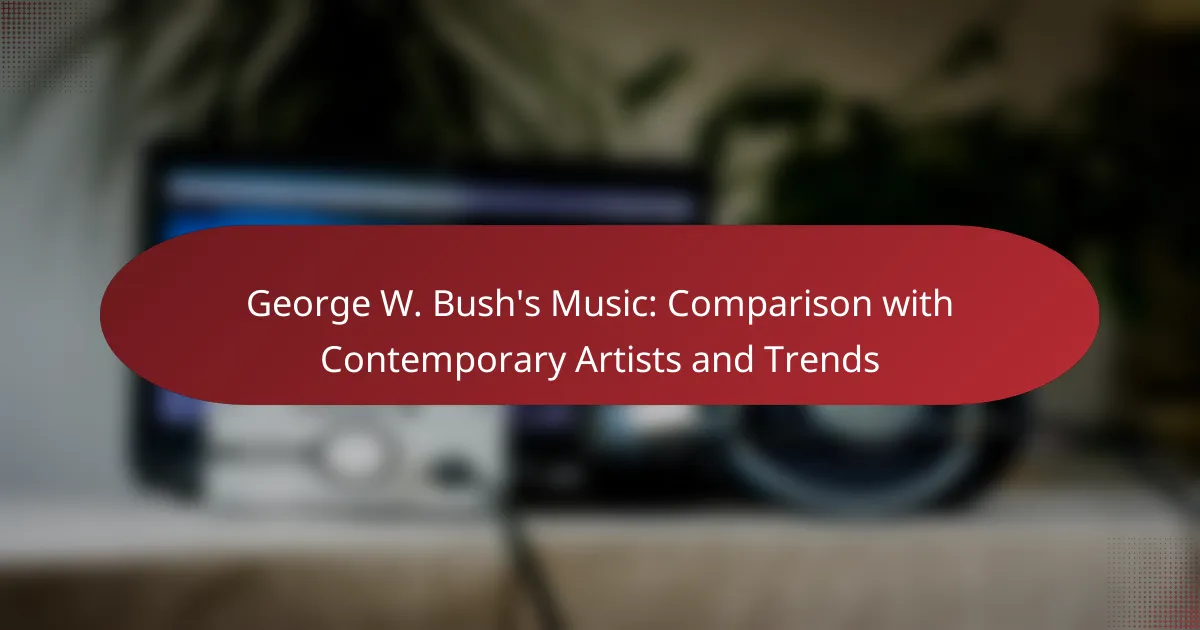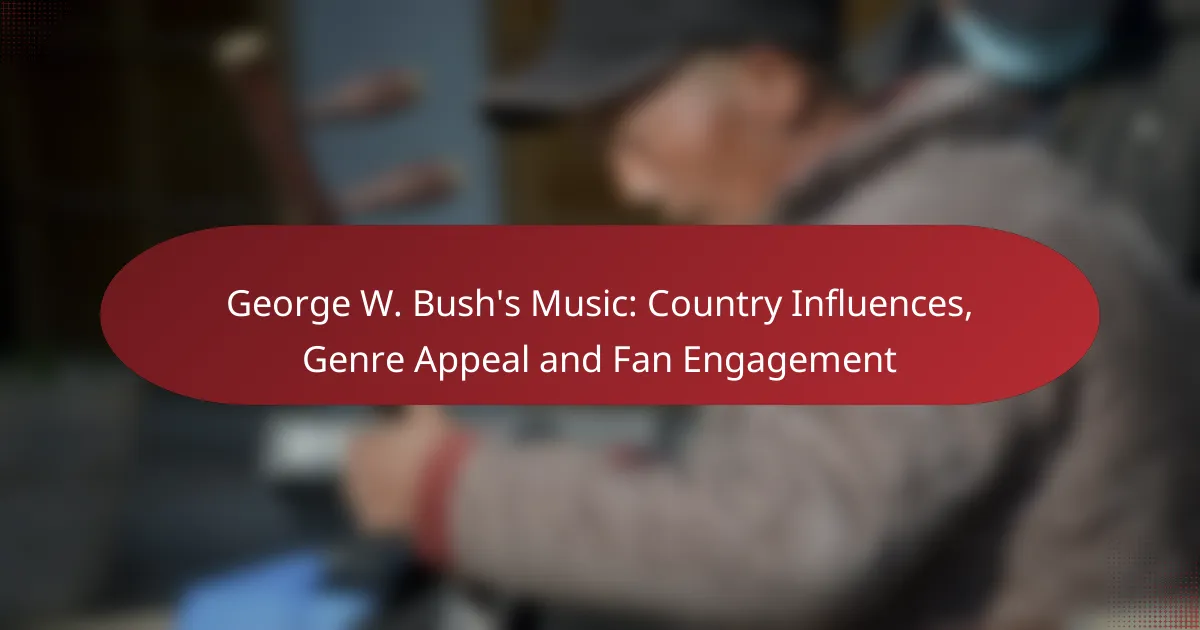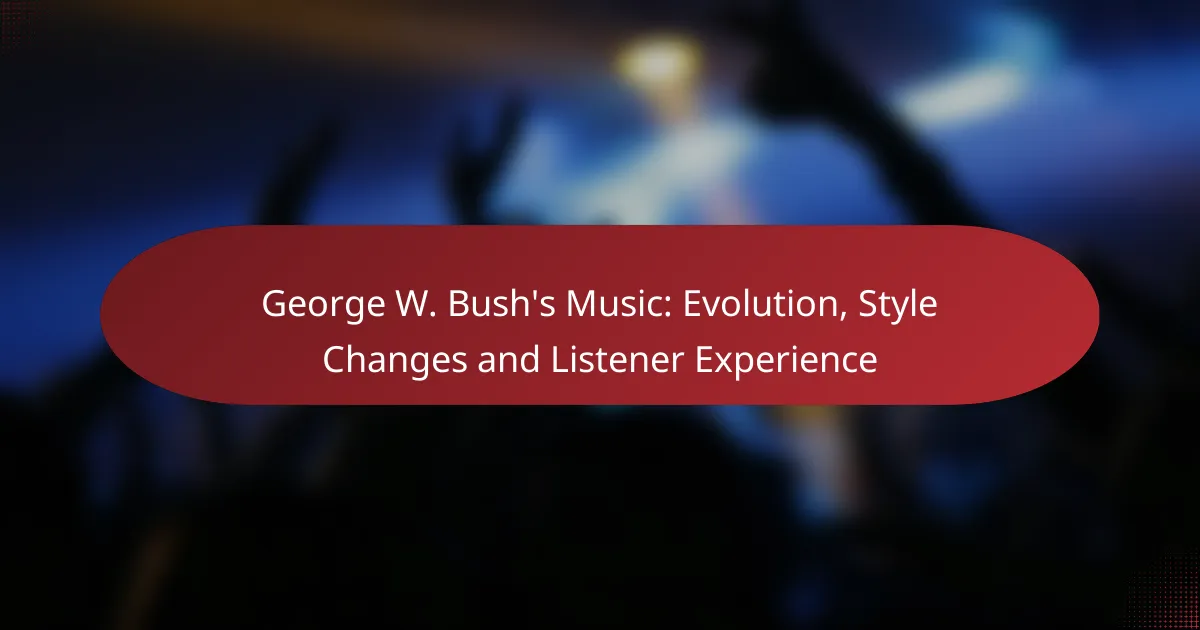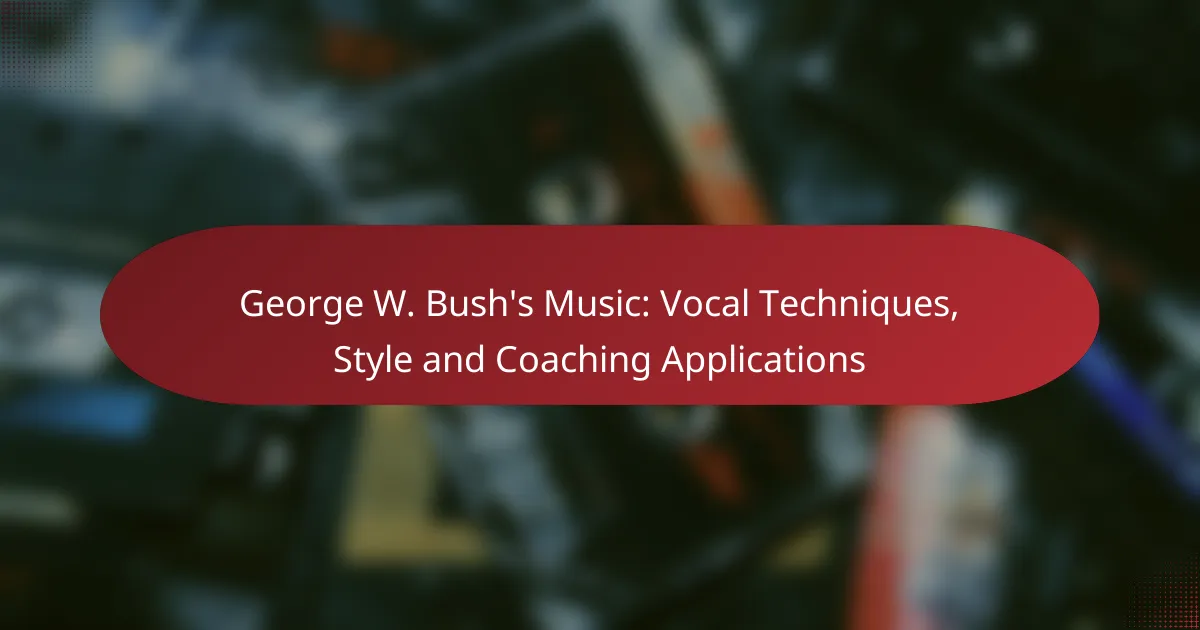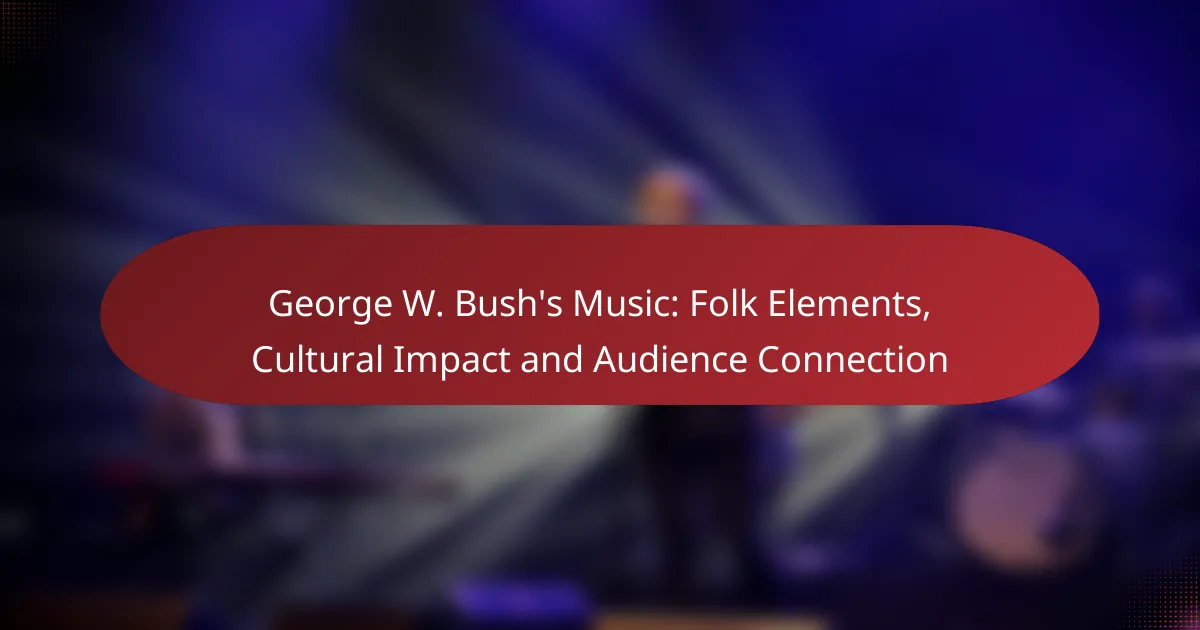George W. Bush’s music, primarily rooted in country and folk genres, stands in contrast to the contemporary landscape where artists blend various styles such as pop, hip-hop, and electronic elements. His work reflects traditional themes and acoustic instrumentation, while modern musicians often experiment with technology and diverse influences. Despite this, several contemporary artists draw inspiration from Bush’s musical style, incorporating themes of patriotism and personal struggle that defined his era.
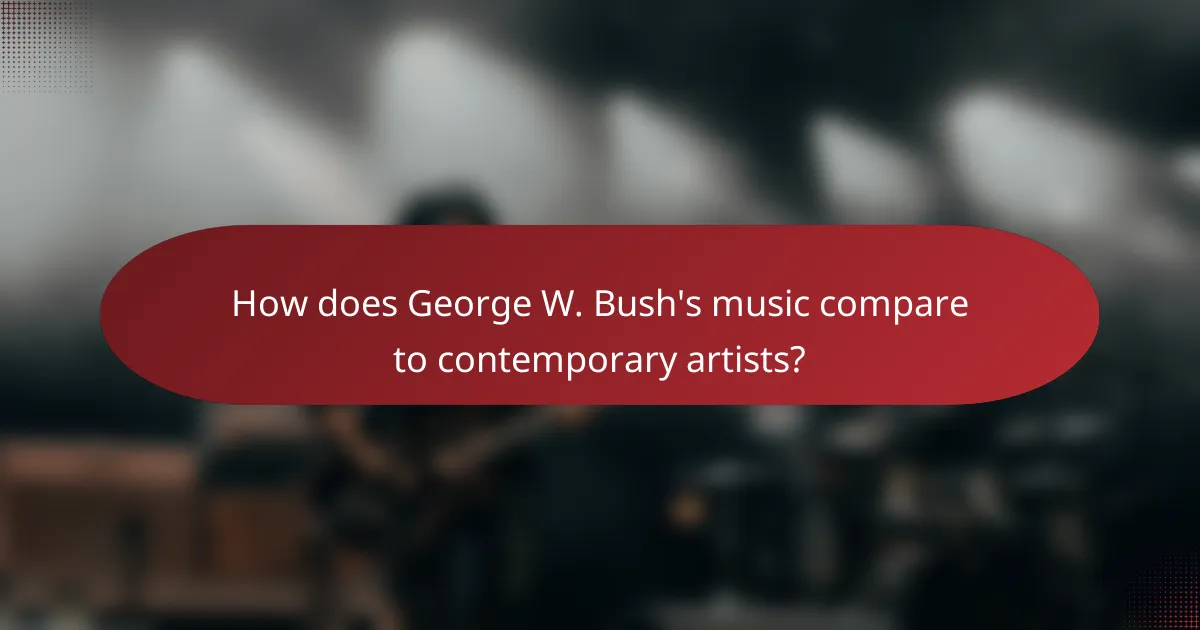
How does George W. Bush’s music compare to contemporary artists?
George W. Bush’s music, primarily rooted in country and folk genres, contrasts with contemporary artists who often blend various styles, including pop, hip-hop, and electronic elements. While Bush’s work reflects traditional themes and acoustic instrumentation, modern musicians frequently experiment with technology and diverse influences.
Musical style analysis
George W. Bush’s musical style is characterized by a classic country sound, featuring simple melodies and straightforward lyrics that often convey themes of patriotism and personal reflection. In contrast, contemporary artists incorporate a wide range of genres, utilizing complex production techniques and diverse instrumentation to create layered soundscapes.
Many modern musicians blend genres, such as country-pop or hip-hop, which allows for a more dynamic listening experience. This fusion often results in innovative tracks that appeal to a broader audience, unlike Bush’s more traditional approach.
Influence on modern genres
While George W. Bush’s music may not have directly influenced contemporary genres, his emphasis on storytelling and authenticity resonates with many modern artists. The simplicity and relatability of his lyrics can be seen in the works of singer-songwriters today who prioritize genuine expression over elaborate production.
Additionally, the themes of resilience and national pride found in Bush’s music echo in various modern genres, particularly in country and Americana, where artists often draw on personal and collective experiences.
Notable collaborations
George W. Bush has collaborated with various musicians, primarily within the country genre, which has helped him connect with fans of that style. His collaborations often feature established artists who share similar musical values, emphasizing traditional sounds and storytelling.
In contrast, contemporary artists frequently collaborate across genres, leading to innovative combinations that push musical boundaries. This trend highlights the versatility and adaptability of modern music, which often involves unexpected partnerships.
Chart performance comparison
George W. Bush’s music has seen limited commercial success, primarily appealing to niche audiences within the country genre. His albums typically rank lower on music charts compared to contemporary artists who frequently achieve high placements across various platforms.
Contemporary musicians often leverage streaming services and social media to boost their visibility and chart performance, resulting in rapid climbs on charts like Billboard. This modern approach contrasts with Bush’s traditional release strategies, which may not resonate as strongly in today’s digital landscape.
Audience reception
Audience reception of George W. Bush’s music tends to be polarized, with supporters appreciating his authenticity and critics often dismissing it due to its simplistic nature. His music appeals primarily to fans of traditional country, who value the straightforward storytelling and emotional connection.
In contrast, contemporary artists often receive broader acceptance due to their innovative styles and diverse influences. Modern audiences tend to favor music that challenges conventions and explores new sounds, which can lead to a more enthusiastic reception for those artists compared to Bush’s work.
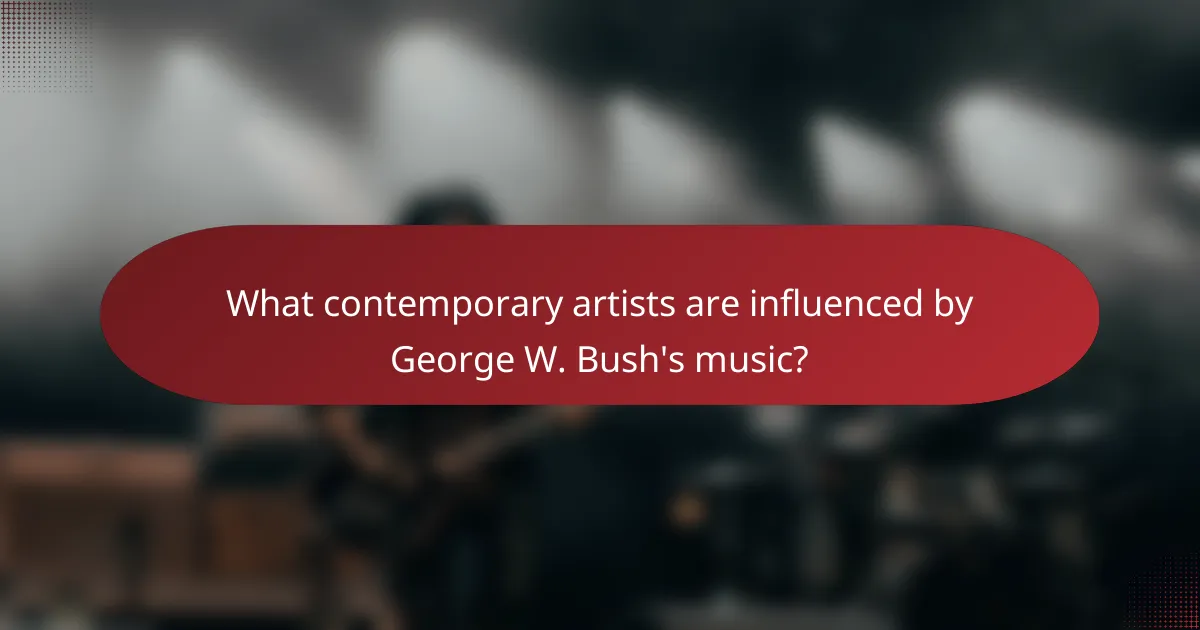
What contemporary artists are influenced by George W. Bush’s music?
Several contemporary artists draw inspiration from George W. Bush’s music, particularly his blend of country and rock elements. These artists often incorporate themes of patriotism, resilience, and personal struggle that characterized Bush’s musical style.
Artists inspired by Bush’s style
Artists such as Toby Keith and Kid Rock have been notably influenced by George W. Bush’s musical approach. They often echo his themes of American pride and resilience in their lyrics, appealing to a similar audience that values these sentiments.
Additionally, newer artists like Brantley Gilbert and Miranda Lambert have adopted a storytelling style reminiscent of Bush’s work, focusing on personal narratives and social issues that resonate with their listeners.
Genres reflecting Bush’s themes
Country music remains the most prominent genre reflecting the themes found in George W. Bush’s music. This genre often emphasizes storytelling and emotional depth, aligning well with the patriotic and personal themes Bush explored.
Rock music, particularly Southern rock, also mirrors Bush’s style, with its roots in American culture and its focus on resilience and identity. Artists in this genre frequently address social and political issues, echoing the sentiments found in Bush’s songs.
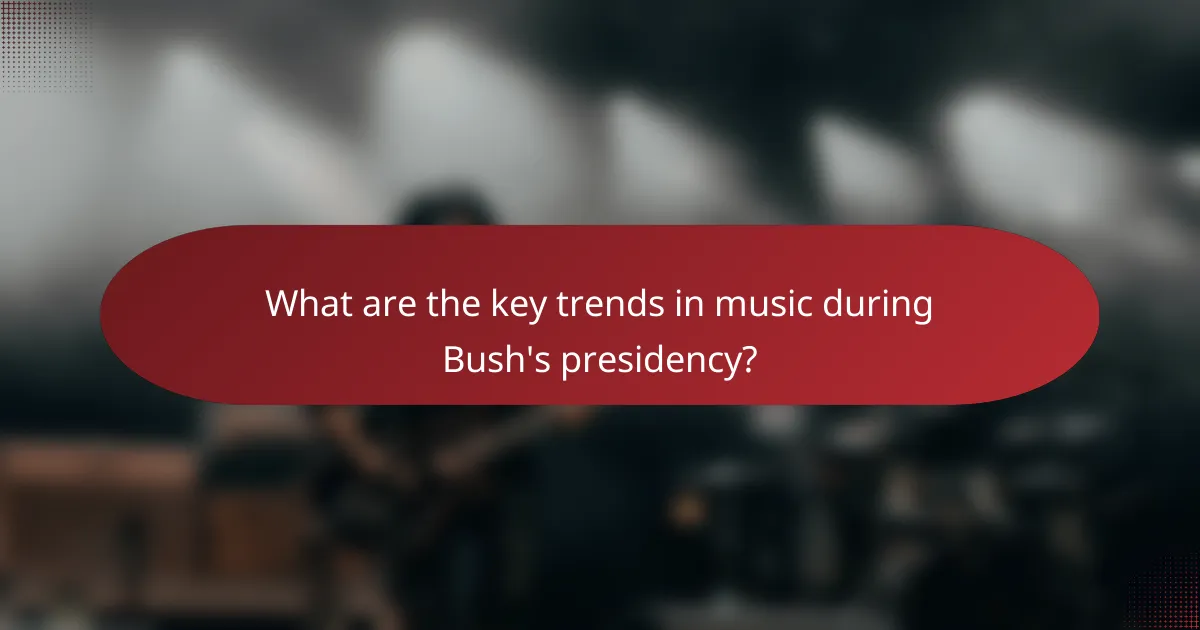
What are the key trends in music during Bush’s presidency?
During George W. Bush’s presidency from 2001 to 2009, music saw significant shifts influenced by technological advancements and cultural movements. The rise of digital music platforms and the blending of genres characterized this era, shaping the listening habits of a diverse audience.
Popular genres of the early 2000s
The early 2000s were marked by the dominance of pop, hip-hop, and rock music. Artists like Britney Spears and NSYNC led the pop scene, while hip-hop gained mainstream traction with figures such as Eminem and Jay-Z. Alternative rock also flourished, with bands like Linkin Park and Coldplay capturing significant attention.
Additionally, the emergence of electronic music began to influence popular genres, leading to a fusion of styles. This period saw the rise of sub-genres like emo and pop-punk, with bands like Fall Out Boy and My Chemical Romance appealing to younger audiences.
Major cultural events impacting music
Several cultural events during Bush’s presidency significantly impacted the music landscape. The September 11 attacks in 2001 prompted a wave of patriotic songs and a resurgence of interest in music that addressed social issues, with artists like Bruce Springsteen and Green Day leading the charge.
The Iraq War and its controversies also inspired musicians to express dissent through their work. This era saw an increase in politically charged lyrics, with artists using their platforms to comment on the socio-political climate, reflecting the sentiments of many Americans during this tumultuous time.
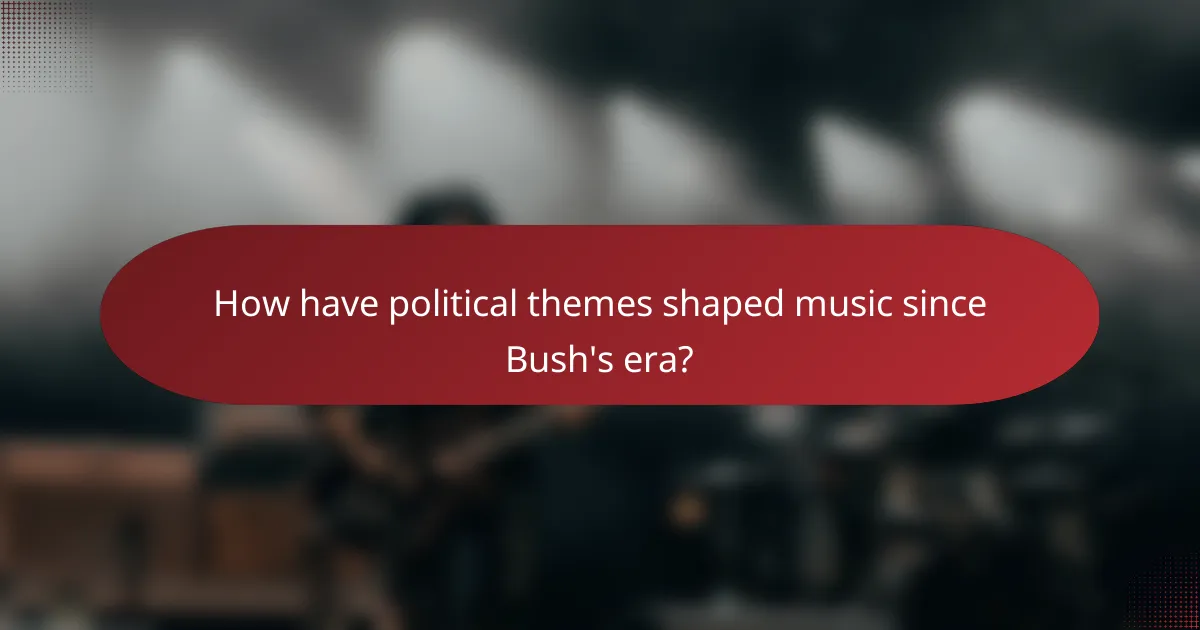
How have political themes shaped music since Bush’s era?
Political themes have significantly influenced music since George W. Bush’s presidency, with artists using their platforms to address social issues, government actions, and public sentiment. This trend has led to a resurgence of politically charged lyrics and a diverse range of musical styles that reflect contemporary societal concerns.
Political commentary in contemporary music
Contemporary music often serves as a vehicle for political commentary, with artists addressing issues such as climate change, social justice, and inequality. Genres like hip-hop and punk rock have particularly embraced this trend, using sharp lyrics and powerful imagery to critique governmental policies and advocate for change.
For instance, artists like Kendrick Lamar and Billie Eilish have incorporated political themes into their work, resonating with younger audiences who are increasingly engaged in activism. This shift reflects a broader cultural movement where music acts as a catalyst for dialogue and awareness around pressing issues.
Comparative analysis of lyrical themes
When comparing the lyrical themes of music from Bush’s era to contemporary artists, a clear evolution emerges. Earlier political songs often focused on broad themes like war and patriotism, while today’s music dives deeper into specific social issues, reflecting a more nuanced understanding of political landscapes.
For example, while songs from the early 2000s might have critiqued the Iraq War, current tracks frequently address intersectional issues such as race, gender, and economic disparity. This shift indicates a growing complexity in how artists engage with politics, moving from general critique to targeted advocacy.
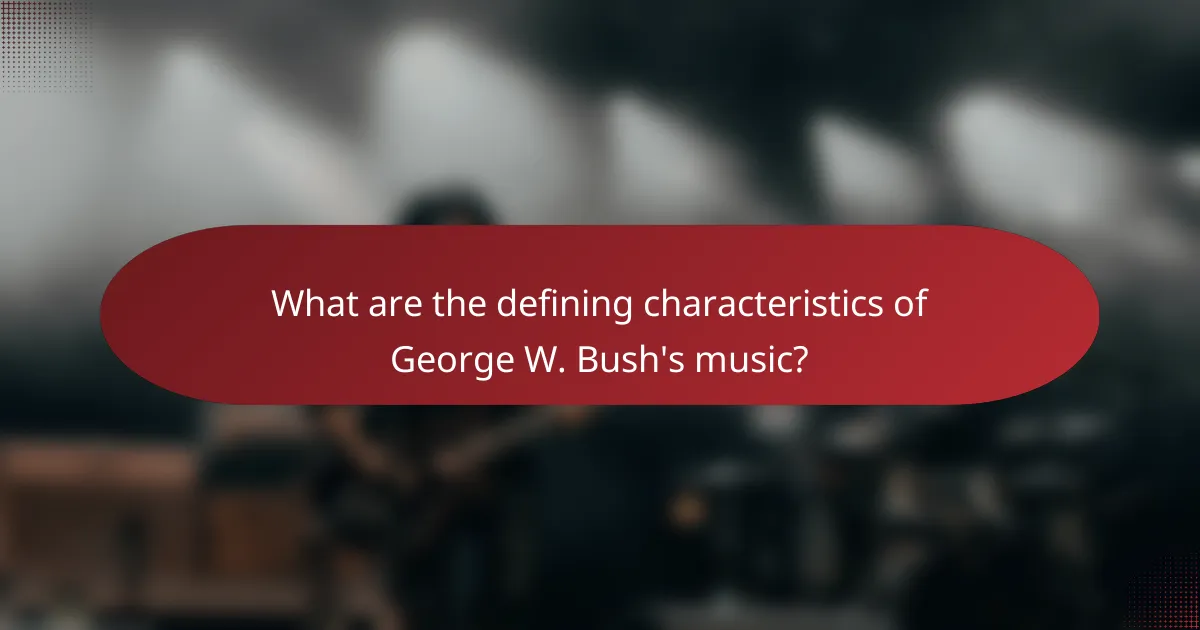
What are the defining characteristics of George W. Bush’s music?
George W. Bush’s music is characterized by a blend of country and folk influences, reflecting his Texan roots and personal experiences. His songs often convey themes of patriotism and resilience, resonating with his political persona and the sentiments of his era.
Musical influences
George W. Bush’s musical influences primarily stem from traditional country and folk artists, such as Johnny Cash and Willie Nelson. These influences are evident in his choice of melodies and storytelling techniques, which often emphasize narrative and emotional connection.
Additionally, the music of the late 1990s and early 2000s, particularly the rise of country-pop crossover artists, played a significant role in shaping his sound. This blend of genres helped him appeal to a broad audience during his presidency.
Lyric themes
The lyrics in George W. Bush’s music frequently explore themes of patriotism, hope, and perseverance. Songs often reflect on American values and the importance of unity, especially during challenging times, such as post-9/11 sentiments.
Moreover, personal experiences and reflections on leadership are common, providing listeners with insight into his thoughts and feelings during his time in office. This focus on relatable themes helps to establish a connection with his audience.
Instrumentation and style
Instrumentation in George W. Bush’s music typically includes acoustic guitars, harmonicas, and simple percussion, creating a warm and inviting sound. This choice of instruments aligns with the folk and country genres, enhancing the storytelling aspect of his songs.
His musical style is generally straightforward and accessible, often featuring catchy melodies and repetitive choruses. This simplicity allows listeners to engage easily, making his music memorable and relatable.
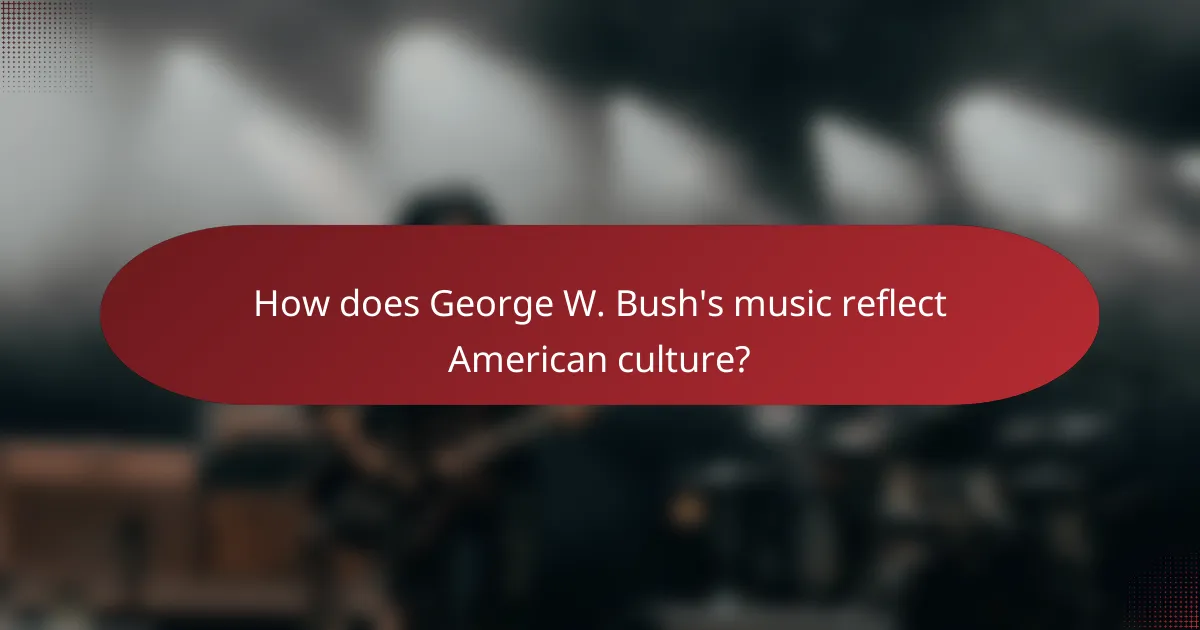
How does George W. Bush’s music reflect American culture?
George W. Bush’s music embodies elements of American culture, particularly through its themes of patriotism and resilience. His musical choices often resonate with the sentiments of the American public during his presidency, reflecting both national pride and the complexities of contemporary issues.
Societal issues addressed
Bush’s music often touches on societal issues such as unity, patriotism, and the challenges faced by Americans during his time in office. Songs that emphasize resilience and hope were particularly prominent, mirroring the national mood following events like the September 11 attacks.
For instance, tracks that celebrate American values and the spirit of togetherness became anthems during his presidency. This focus on societal issues helped to foster a sense of community and shared purpose among listeners, reinforcing the cultural narrative of strength in adversity.
Moreover, Bush’s musical selections often included genres like country and rock, which are deeply rooted in American culture. These genres not only appeal to a broad audience but also serve as a vehicle for expressing the sentiments and struggles of everyday Americans, making his music relatable and impactful.



